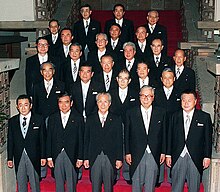Yōhei Kōno
Yōhei Kōno | |
|---|---|
河野 洋平 | |
 | |
| Speaker of the House of Representatives of Japan | |
| In office 19 November 2003 – 21 July 2009 | |
| Prime Minister | Junichirō Koizumi Shinzō Abe Yasuo Fukuda Tarō Asō |
| Preceded by | Tamisuke Watanuki |
| Succeeded by | Takahiro Yokomichi |
| President of the Liberal Democratic Party | |
| In office 29 July 1993 – 1 October 1995 | |
| Preceded by | Kiichi Miyazawa |
| Succeeded by | Ryutaro Hashimoto |
| Leader of the Opposition | |
| In office 9 August 1993 – 10 June 1994 | |
| Prime Minister | Morihiro Hosokawa Tsutomu Hata |
| Preceded by | Sadao Yamahana |
| Succeeded by | Toshiki Kaifu |
| President of the Japan Association of Athletics Federations | |
| In office 1999–2013 | |
| Preceded by | Hanji Aoki |
| Succeeded by | Hiroshi Yokokawa |
| Personal details | |
| Born | 15 January 1937 Hiratsuka, Kanagawa, Japan |
| Children | Tarō Kōno |
| Alma mater | Waseda University |
Yōhei Kōno (河野 洋平, Kōno Yōhei, born 15 January 1937 in Hiratsuka, Kanagawa) is a Japanese politician and a former President of the Liberal Democratic Party. He served as Speaker of the House of Representatives from November 2003 until August 2009, when the LDP lost its majority in the 2009 election. Kōno served as speaker for the longest length since the set up of House of Representatives in 1890.[1] He was the president of the Japan Association of Athletics Federations from 1999 to 2013.[2]
History
Kōno is the eldest son of Ichirō Kōno, a former minister dealing with the Tokyo Olympic Games.
Kenzō Kōno, the chairman of the House of Councillors from 1971 to 1977, was his younger uncle.
After graduating from Waseda University Senior High School, he studied Economics at Waseda University. Upon graduation, Kōno worked with the Marubeni company. In 1967, Kono's political career began due to the death of his father.
Political career

He was Deputy Prime Minister from 1994 to 1995. He was Minister of Foreign Affairs under Prime Minister Tomiichi Murayama and Murayama's successor Yoshirō Mori. He is a member of the Liberal Democratic Party (LDP). He was once President of the LDP from 1993 to 1995, and to date is the only LDP leader except for Sadakazu Tanigaki to have never served as Prime Minister of Japan. As he is one of the pro-Chinese members of the LDP, he came under pressure domestically in the spring of 2005 when anti-Japanese movements in China became intense.
Kōno is well known as a controversial figure within the comfort women debate, for the official statement he made in 1993, when he was Chief Cabinet Secretary. In his statement, made after historian Yoshiaki Yoshimi announced he had discovered in the Defense Agency library in Tokyo documentary evidence that the Imperial Japanese Army established and ran "comfort stations", he essentially admitted that the Japanese Imperial Army had been involved, directly and indirectly, in the establishment of comfort facilities, and that coercion had been used in the recruitment and retention of the women. His subsequent call for historical research and education aimed at remembering the issue became the basis for addressing the subject of forced prostitution in school history textbooks.
Footnotes
- ^ "Kono's tenure longest as speaker". The Japan Times. 20 November 2008. Retrieved 22 November 2008.
- ^ The Successive President and Vice-President and Senior-Managing-Director of JAAF (日本陸連歴代会長・理事長・専務理事) (in Japanese) Japan Association of Athletics Federations. Retrieved 13 June 2012.
- Use dmy dates from February 2012
- 1937 births
- Living people
- Politicians from Kanagawa Prefecture
- People from Hiratsuka, Kanagawa
- Waseda University alumni
- Speakers of the House of Representatives (Japan)
- Members of the House of Representatives (Japan)
- Government ministers of Japan
- Foreign ministers of Japan
- Japanese racehorse owners and breeders
- Liver transplant recipients
- Liberal Democratic Party (Japan) politicians
- New Liberal Club politicians
- 21st-century Japanese politicians
